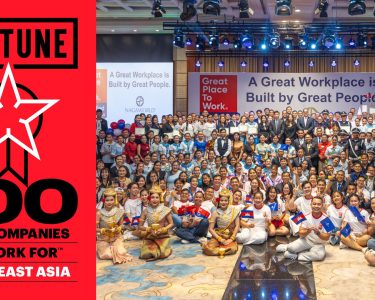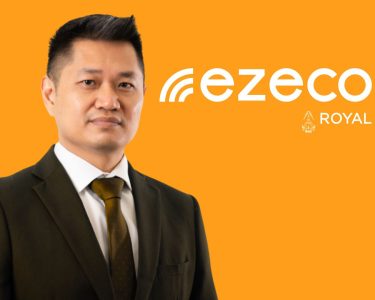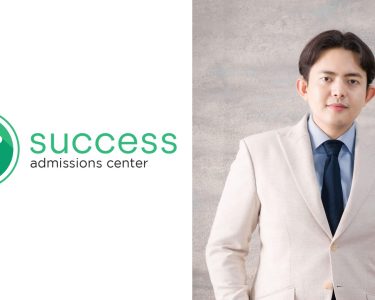By EuroCham Communications Intern Henry Henderson
For this week’s interview, the Communications team headed to Phnom Penh International Airport to speak with Mrs. Caroline Bougon-Sirieix, Secretary General of Cambodia Airports and the new Vice-Chair of EuroCham’s Human Resources Committee.
Starting with her journey into human resources, the conversation explored her “keys” to HR, the power of cross-cultural understanding, and the challenges and opportunities her team are facing with the transition to the new Techo International Airport.
Henry: First of all, could you walk us through your career journey in human resources? What first drew you to the field, and how have your experiences with companies like CWT, Air France, and VINCI Airports shaped your path?
Caroline: How do I summarise almost 60 years of life? In fact, I started my career in finance, handling finance and general administration in an English company. The first part of my career was in the semiconductor industry—I worked 16 years in that field. It was a dynamic, international environment because the technology cycles were short. You’d set up research, then production, and as soon as you were wrapping up production, you’d start another cycle.
Read More: VINCI Selected by CAIC to Operate Techo International Airport, Phnom Penh’s New Gateway
And I progressively moved into the HR field. I moved from France to Singapore and, while looking for a job, I walked into Air France-KLM, where I worked in HR. That was when Air France and KLM were merging. The employees had been competitors and suddenly they had to sit side-by-side, defending both brands and working together. That was quite an interesting journey.
I stayed for eight years, covering Australia, New Zealand, Indonesia, Malaysia, Singapore, and coordinating projects across Asia-Pacific. Later, I moved with Air France-KLM to Australia, then China. At one point, as another, I had to return to France. There, I joined CWT as head of labour relations for Western Europe. I was based in Paris, commuting between there, Belgium, and Luxembourg.
Henry: You’ve worked across a variety of sectors and cultural contexts. What brought you to Cambodia specifically? What are some of the key challenges in your current role within such a large company?
Caroline: What brought me back to Asia? First, I’d say my “Asian DNA”—which I don’t really have! But I had already spent 13 years in Asia, so I wanted to come back.
Being in the airport and air transport industry was important and I worked across many countries in the region. Cambodia was one of the few I had not worked in. Though I’d visited as a tourist in 2007, I didn’t have deep knowledge of the country. When I had the opportunity to join VINCI Airports, I was happy to do so.
When I arrived in January 2022, Cambodia was just emerging from the COVID period. Compared to Europe, it was a slower recovery, but I saw the appetite for growth and development here. You see that dynamic energy every day.
The challenge in the aftermath of the covid crisis was maintaining a common goal and ambition, which has to constantly be revitalised in big companies. It’s a top management responsibility to ensure there’s a shared mission, ambition, and set of values.
Conveying that vision is a project in itself—with a roadmap, communication plan, and strategy for engaging employees at all levels.

Henry: What are some of the key differences between your work in Europe and Asia? Are there differences in management styles or challenges and do you feel your time in both environments gives you an advantage in terms of meeting people where they are?
Caroline: When I returned to Paris after my time in Asia, it felt almost like a new expatriation for me. I’m comfortable in the workplace culture of Asia.
That said, I’ve always worked for European companies, so even with local employees, you have this double layer—local culture and European culture. That creates a unique environment for management. One thing I can highlight is that communication styles differ. In Europe, communication can be more direct, even confrontational at times, whereas in Cambodia it tends to be gentler and more respectful. That’s one of the key differences I have noticed.
As for advantages, yes, absolutely. People stepping into an environment that isn’t their own culture develop a flexible mindset. They’re curious, willing to explore, adapt, and communicate—and that’s what I see here among the team.
We’re very agile, and people can adjust to changes and new ways of working.
Henry: With the upcoming airport opening, what challenges or opportunities do you anticipate for your team? How are you preparing for the expansion and how is your staff feeling about the transition?
Caroline: It is a big airport, five times bigger than the current one. For us, everything is about change management. There’s adrenaline and excitement about the project. We did a survey in March and the majority of the staff feel excited and proud to be part of the project. Excitement and pride are the dominant feelings and, of course, there are a few question marks during this transition period.
Some employees have been here a long time, working with the same colleagues. We have to be mindful of the unknowns that weigh on their minds and support them in facing the unknown.
We’ve done familiarisation trips so people can see the new airport. We provided change management training to help employees handle the new challenges, and to help managers support their teams. Communication—sharing progress and milestones—is key to building confidence and easing the transition.
Practically, safety is at the center of our focus—for employees and all stakeholders. We’ll need to reinvent some processes to match the new space, but our people are experts—they’ll remain experts. Our long-serving employees know their jobs. The challenge is adapting to a new environment, but their core competencies remain. It’s the same, but different.
It’s about ensuring staff feel comfortable and confident in the new environment, from day one.

Henry: Congratulations on being appointed Vice-Chairperson of the EuroCham HR Committee. What motivated you to step into that position? Do you have any plans yet for the HR Committee?
Caroline: Thank you. What motivated me is the desire to make a collective contribution. I have quite a lot of experience in HR and since arriving here, I’ve interacted with many other HR practitioners. Together, we already have ideas on how to support the HR community and SMEs, where managers may not have all the HR skills in-house.
I believe human resources are key to company growth. My vision is to support companies to get the tools they need for a profitable and respectful partnership with their employees.
Henry: What advice would you give HR professionals who want to drive performance and purpose, especially in cross-cultural settings like Cambodia?
Caroline: To create a profitable partnership between company and employee, certain keys need to be in place: solid communication, trust, and enabling people to grow. HR teams should see themselves as service providers to internal customers—as partners. There’s no hierarchical gap; you work hand in hand.
HR is like a brick in the wall—you have to build your own competencies and expertise to offer solid services and also to be a source of proposals. You need to be proactive, able to challenge viewpoints, and engage with peers and management alike.
The other key is understanding the business. If you don’t, you’ll only do a third of the job. Your role is to support business development by aligning HR—development, recruitment, profiles—with the business. Also, the usual: listen well, don’t judge, assess objectively.
Which skills to build HR foundation? Curiosity. I always say curiosity is a great quality. If you want to understand, you need to be open and be curious.





